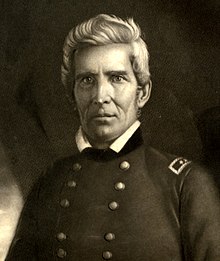This article needs additional citations for verification. (May 2019) |
William Butler | |
|---|---|
 | |
| Member of the U.S. House of Representatives from Kentucky's 13th district | |
| In office March 4, 1839 – March 3, 1843 | |
| Preceded by | William Southgate |
| Succeeded by | Constituency abolished |
| Personal details | |
| Born | William Orlando Butler April 19, 1791 Jessamine County, Kentucky, U.S. |
| Died | August 6, 1880 (aged 89) Carrollton, Kentucky, U.S. |
| Political party | Democratic |
| Education | Transylvania University (BA) |
| Military service | |
| Branch/service | United States Army |
| Years of service | 1812–1815; 1846–1848 |
| Rank | Major General |
| Commands |
|
| Battles/wars | War of 1812 |
William Orlando Butler (April 19, 1791 – August 6, 1880) was a U.S. political figure and U.S. Army major general from Kentucky. He served as a Democratic congressman from Kentucky from 1839 to 1843, and was the Democratic vice-presidential nominee under Lewis Cass in 1848.
Born in Jessamine County, Kentucky, Butler studied law after graduating from Transylvania University. He served in the War of 1812, taking part in the Battle of the Thames and the Battle of New Orleans. After the war, he practiced law in Carrollton, Kentucky, and briefly served in the Kentucky House of Representatives. He served in the United States House of Representatives from 1839 to 1843 before running for Governor of Kentucky in 1844. He lost the 1844 gubernatorial election to Whig nominee William Owsley.
During the Mexican–American War, Butler served as a major general of volunteers. He was General Zachary Taylor's second-in-command during the Battle of Monterrey and later succeeded Winfield Scott as the commander of American forces occupying Mexico City. The 1848 Democratic National Convention nominated a ticket of Cass and Butler, but the Whig ticket of Taylor and Millard Fillmore won the 1848 presidential election. He attended the Peace Conference of 1861, which sought to defuse the secession crisis that arose following the 1860 presidential election. During the Civil War, Butler was a War Democrat who favored the Union.